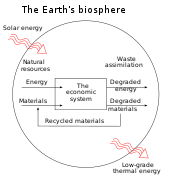
Ecological economics
Interdependence of human economies and natural ecosystems / From Wikipedia, the free encyclopedia
Dear Wikiwand AI, let's keep it short by simply answering these key questions:
Can you list the top facts and stats about Ecological economics?
Summarize this article for a 10 years old
Ecological economics, bioeconomics, ecolonomy, eco-economics, or ecol-econ is both a transdisciplinary and an interdisciplinary field of academic research addressing the interdependence and coevolution of human economies and natural ecosystems, both intertemporally and spatially.[1] By treating the economy as a subsystem of Earth's larger ecosystem, and by emphasizing the preservation of natural capital, the field of ecological economics is differentiated from environmental economics, which is the mainstream economic analysis of the environment.[2] One survey of German economists found that ecological and environmental economics are different schools of economic thought, with ecological economists emphasizing strong sustainability and rejecting the proposition that physical (human-made) capital can substitute for natural capital (see the section on weak versus strong sustainability below).[3]
| Part of a series on |
| Ecological economics |
|---|
 Humanity's economic system viewed as a subsystem of the global environment |
|
Concepts
|
Ecological economics was founded in the 1980s as a modern discipline on the works of and interactions between various European and American academics (see the section on History and development below). The related field of green economics is in general a more politically applied form of the subject.[4][5]
According to ecological economist Malte Michael Faber [de], ecological economics is defined by its focus on nature, justice, and time. Issues of intergenerational equity, irreversibility of environmental change, uncertainty of long-term outcomes, and sustainable development guide ecological economic analysis and valuation.[6] Ecological economists have questioned fundamental mainstream economic approaches such as cost-benefit analysis, and the separability of economic values from scientific research, contending that economics is unavoidably normative, i.e. prescriptive, rather than positive or descriptive.[7] Positional analysis, which attempts to incorporate time and justice issues, is proposed as an alternative.[8][9] Ecological economics shares several of its perspectives with feminist economics, including the focus on sustainability, nature, justice and care values.[10] Karl Marx also commented on relationship between capital and ecology, what is now known as ecosocialism.[11]